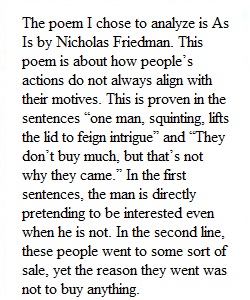


Q Assignment Post After reading "Learning the Sonnet" from this week, select one of the sonnets listed below and discuss how its form (meter and rhyme) contributes to its meaning. Your analysis should be at least two paragraphs long and should integrate a discussion of meter and rhyme. For your convenience, I've listed the poems here: Shakespearean Sonnets • Hall of RecordsLinks to an external site., by Peter SpagnuoloLinks to an external site. • As IsLinks to an external site., by Nicholas FriedmanLinks to an external site. • The CraftsmanLinks to an external site., by Marcus B. ChristianLinks to an external site. • The Hurt SonnetLinks to an external site., by Casey ThayerLinks to an external site. (though you’ll notice the short final line and lack of rhyme for this couplet, which refers beautifully back to the loss in the subject of the poem) • What to Say Upon Being Asked to Be FriendsLinks to an external site., by Julian Talamantez BrolaskiLinks to an external site. • Fruit Don’t Fall FarLinks to an external site., by Elsa von Freytag-LoringhovenLinks to an external site. Petrarchan Sonnets • The Unquarried Blue of Those Depths Is All But BlindingLinks to an external site., by Ashley Anna McHughLinks to an external site. • Photo of Melville; Back Room, Old BookstoreLinks to an external site., by Stephen SandyLinks to an external site. • Grieve NotLinks to an external site., by Walter Clyde CurryLinks to an external site. • After Fifty YearsLinks to an external site., by William FaulknerLinks to an external site. • [Show me the body that brides its quest]Links to an external site., by Karen VolkmanLinks to an external site. (note that Volkman inverts the rhyme scheme in the final three lines) • The ProfessorLinks to an external site., by Joshua MehiganLinks to an external site. (Mehigan also changes the rhyme scheme of the sestet minimally) Response Your response has three elements. Please develop each in its own paragraph. Please respond to one classmate. 1. Summarize your partner's analysis. 2. What insights or useful questions do you find by working with both your post and your partners? 3. What is one important takeaway you have from this assignment? Module Learning Objectives Grading As we discussed in the syllabus, your grade on the assignment will be determined by the discussion board rubric. You can access it by clicking on the three vertical dots near the top of your screen. (Please see the video below for a quick tutorial.) You may revise and resubmit your discussion board posting and/or response until the module that contains it closes. Support Photo by Hans M on UnsplashLinks to an external site. Writing Effective Discussion Board Posts • The Writing Across the Curriculum (WAC) programLinks to an external site. is among the most useful resources for writing assignments at American River College. • The American River LibraryLinks to an external site. is a great source for finding evidence and for documentation. • And here's an overview of what a post and response should include. Using Canvas Here are the official Canvas tutorials that answer the questions: The following resources may help you complete this task: • How do I reply to a discussion? • How do I view and sort discussion replies? Alternatively, here's a quick overview I created: Questions If you have any questions about this assignment, please contact me through Canvas. ________________________________________ Click Next at the bottom right of each page to move through the module.
View Related Questions